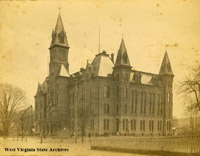

Chapter Two |
|
"West Virginia now enjoys the proud distinction of being the first and only State in [the] Union to have three Governors. The inauguration was comparatively quiet, . . . About 11:30, General Goff, accompanied by Chairman Cowden, Capt. H. C. McWhorter, and followed by a number of his personal and political friends, and interested spectators, started toward the Capitol. Of course the crowd grew in numbers as it neared the Capitol and by the time the Governor's office was reached there were probably 500 people in attendance. The doors of the Governor's reception room were thrown open and in a few minutes it was crowded with an interested throng, representing all ages, colors and political opinions, every one on the tip-toe of expectancy and pushing forward in the hope of seeing and hearing what was going on. General Goff was courteously received by Governor Wilson and invited into his private office, where he spent a few moments, returning to the Governor's reception rrom a few minutes later. Just at 12 o'clock he mounted a chair by the desk of Governor Wilson's private secretary and facing the crowd, addressed them . . .
Captain H. C. McWhorter, with a neat morrocco bound Bible in hand, then stepped forward and proceeded to obligate General Goff to obey the Constitution of the State, etc., after the form provided in such cases. . . . , he [Governor Wilson] was of the opinion that there had been no election. In such a case he believed it to be his duty to hold the office until such declaration had been made, and for that reason he refused the demand, pledging himself that everything in his power that could be done to facilitate an early determination of the question should be done cheerfully. . . .
A few minutes later Hon. R. S. Carr, President of the Senate, accompanied by A. D. McCorkle, arrived at the Capitol building, and at once proceeded to the Governor's office, where they were cordially received by Governor Wilson. Only a few spectators were present, but those who were there watched the proceedings with considerable interest. Mr. McCorkle administered the oath of office, and Mr. Carr then made a formal demand for the office, . . . Governor Wilson replied in about the same words used in his reply to General Goff, that as under the Constitution no Governor had been declared elected, he believed it to be his duty to hold the office until his successor was duly elected and qualified. . . . ." |
The inauguration that should have taken place on March 4, 1889, proved merely a continuation of the uncertainty surrounding the 1888 gubernatorial election, a contested election that delayed final determination of a winner for more than a year. Governor E. Willis Wilson continued to hold the governor's office while Nathan Goff, the Republican candidate, and Aretas Brooks Fleming, the Democrat, fought for the seat. When the election remained unsettled as inauguration day approached, Robert S. Carr attempted to take the governor's office in his capacity as President of the Senate.
On March 4, 1889, two men--Nathan Goff and Robert S. Carr--took the oath of office, and Goff even gave an inaugural address. However, Governor Wilson refused to surrender the governorship in the absence of a declared election. It was not until February 4, 1890, that Fleming was finally declared the victor of the 1888 election. |
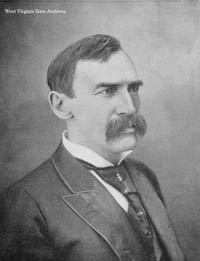 Governor E. Willis Wilson
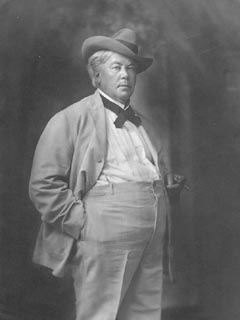 Robert S. Carr
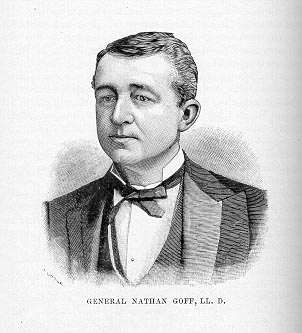 Nathan Goff |
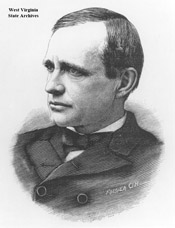 Aretas Brooks Fleming Aretas B. Fleming's inauguration took place two days later, on February 6, 1890. Fleming and Governor Wilson headed a procession from the Ruffner Hotel on Kanawha Street to the capitol escorted by Gates Band. After the Rev. Mr. W. H. Torrence of Kanawha Presbyterian Church gave a prayer and Wilson introduced the governor-elect, Fleming gave his inaugural address. Justice J. W. English administered the oath of office, the governor's guard fired a salute, and Fleming and Wilson moved to the reception room, where they received guests for more than an hour. In the evening, a reception was held in the governor's rooms, during which Gen. Jubal A. Early appeared and received a "grand ovation." A ball was held in the armory, with music provided by the Opera House Orchestra of Wheeling. |
|
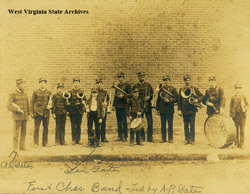 Gates Band |

